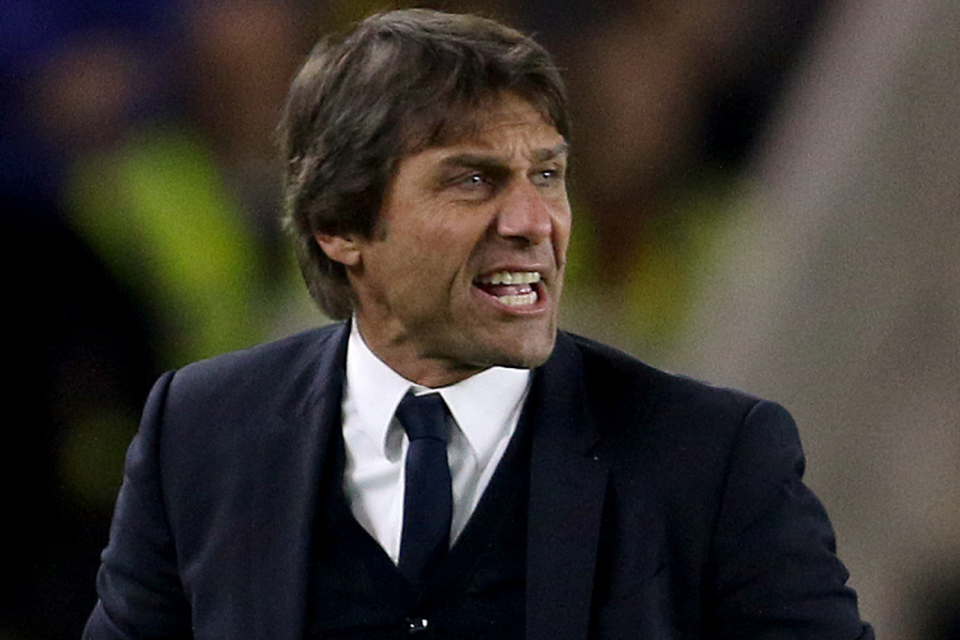Stephen Hunt: Players rarely decide to down tools - things are usually a lot more complicated than that
Chelsea look rejuvenated under Conte but perhaps it was just a change of scenery that was needed
Chelsea manager Antonio Conte looks to have his players on his side
I used to absolutely hate my manager at Brentford, Martin Allen. No word of a lie, there were times when I wanted to leave the foot in when training. It was the accumulated anger and frustration of not playing, because he just didn't take to me. No matter what I did, or what I tried, he just threw it back in my face. I could never change his mind.
So sometimes he would get involved in a training game to maybe demonstrate how to tackle, and you would want to smack him as he was coming through. I really had that hatred for him. Now half of that was because I was young and didn't understand football politics or how to play it, but the other side of it was that if he had put me on that pitch I would still have played my heart out for him.
It was an experience that came to mind when thinking about Chelsea, Manchester United and this whole idea of the 'responsibility' of players and whether they ever 'down tools' on a manager. The extremes of the Chelsea situation are something else, it has to be said. They've gone from losing almost every week to this incredible winning run. From the outside, it does look like they're fully playing for Antonio Conte, in a way they just didn't for Jose Mourinho.
I wouldn't see it like that, though. Players don't down tools. It's a lot more complicated than that.
There is maybe a subconscious issue, where you can't give your all but, in the heat of a game, you're still convincing yourself you're doing your best. You still believe you're putting it in.
The Chelsea situation is an interesting case study. I've played with a fair few lads who had Mourinho as their manager, and they still all love him. They would be waxing on about how he managed them, how he always knew how to handle things, whether it be down to tactics or man-management or whatever. He would always say the right thing at the right time.
I didn't see any of that last season at Chelsea. Instead I saw Mourinho doing ever more drastic things, and publicly criticising players in an increasingly extreme manner, in a way that didn't really chime with what some of his former players told me, in an attempt to address what was going wrong. None of it worked. They were still dropping points.
Amid all the celebration about how Chelsea are playing right now, there has been an undercurrent that they underperformed for Mourinho, but I wouldn't say it's like that. I've written in this column before about how, when a team is on a bad run of form, the manager needs to change something to jar them out of it. A freshness is required. Sometimes, though, the situation is so extreme that it's just the manager who has to change. That's when it's too far gone.
I think that's what Chelsea's transformation is about. Just a different face was needed.
I have been in situations where players are fed up of a manager's style, but he has them so well-drilled that the muscle memory of his approach still has them getting results. That was what it was like with Giovanni Trapattoni at the end. His training had become repetitive, and he had probably lost some of the boys in that regard, but he was still getting results for a longer period than he should have due to the strength of his system.
It still told in the end, though. It still unravelled. The lads still just needed a different face. It's human nature, as much as anything to do with football.
It obviously helps at Chelsea that Conte has offered so much more than a different face. I'm a big fan of his 3-4-3, and the way it gives them a balance and purpose right across the pitch. It's just that freshness.
The truth, however, is that almost every manager has a sell-by date. Alex Ferguson was one of the few who didn't, and there may never be another like him. But then maybe that was down to the way he had the foresight to change his team every few years, and have so many different assistant managers as alternative voices. That could be an issue for Mourinho, too, that he's still playing with the same staff, and in the same way. It does seem he has become harder-edged than he used to be, and maybe he's trying to get that presence back.
The best teams I've played in have had a very relaxed environment, where players go out for dinner with the coaches, and don't mind socialising together. You still know where the line is. I would be vocal with Mick McCarthy, for example, but I would never, ever cross him. It's the ones that so clearly make it 'us against them' that can have problems.
If players don't necessarily down tools, though, what is undeniably true is that some can feed situations. I've seen it. They'll be those lads just moaning that bit too much about the manager, trying to get little cliques together to go against him, to plant seeds.
'Oh, why's he playing this way,' they'll say, or, '4-4-2 again?' If they can find a weakness in that manager, too, they're quite happy to seize it and use it to their advantage, sometimes to wind him up.
On nine out of 10 occasions, I'd say it's the players who aren't getting their game. But that's a big key to management: keeping the players who aren't playing happy.
When it's beyond that, and two or three start to doubt him in the starting XI, it does have an effect on the whole team. You're going out there knowing some lads just don't want to play for this manager. And, while they'll still follow instructions and still put it in, they're just not running with the same intensity or determination. You notice small nuances. They'll go to stop a cross, earnestly trying to do so, but it won't be driven by that deeper desire that can make the difference.
In terms of actually getting a manager sacked, mind, the club officials are usually more to blame than the players. When things are going badly, they will often come hunting for info, and ask the players what they think. That furthers the uncertainty, creates more of a problem. I don't think they should do that. I've been in situations where I've had people on the club board come to me, but I've told them, 'It's not my place to talk'. Some players would talk.
Steve Morgan, the chairman at Wolves, once went even further. He came down to the changing room on the Monday after a game and started firing bullets at players and the manager. There was pure silence in the room other than his voice, except I could hear my heart beat because I knew I was going to stop him in his tracks. I was counting to 10, trying to keep my temper down, but I eventually told him to - I think - "Shut the fuck up".
When he asked why, I said, one, I thought it was disrespectful and, two, it's unfair to question our desire. You can question our ability all you like, okay, but it again comes down to perspective.
Sometimes, when you're looking from above, it seems like the players aren't trying.
In the vast majority of cases, though, it's just a pure lack of confidence combined with a management staff that have run out of ideas. There's a mental exhaustion. That's why you'll see those same teams suddenly getting beaten by five, six even seven, because it all caves in once one thing goes wrong in a match.
That's why you need that change.
That's why it's an awful lot more complicated than just 'downing tools'.















